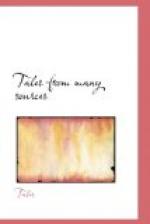“Five hundred pounds,” said Betty. “Alas! the reward is tempting.”
“He has escaped so often from their very midst, has more than once been prisoner, has often baffled his swiftest pursuers. Next time Wild Jack is taken, his shrift will be short, I warrant.”
The tears rose to Betty’s eyes.
“God grant him a safe escape to France,” she said earnestly.
“It is a good and a charitable wish, sweetheart,” said John somewhat gloomily. “But men who have lived as Wild Jack has lived, dread, exile as much as death.”
“Surely,” said Betty, “that depends upon whether he is utterly friendless, or has any who love him.”
“Wild Jack is not utterly friendless,” he answered with a grave sweet smile.
“And this also is one of the mysteries,” said Betty gaily. “Do not forget your promise, that some day you will tell me all the past history of your life, and also, above all, the story of your acquaintance with the most famous gentleman of the road.”
“Aye, some day,” he said, closing the door of Seagull’s home, and placing the key in his pocket.
As they turned away he said suddenly: “Say nothing about my treasure in there, dear Bet, I beg of you, neither to your father nor to Mistress Mary.”
Betty looked up at him somewhat surprised.
“Oh, it is for a trifling reason,” he said—“a mere wager.”
So the matter faded from her mind.
The elders of the little party now summoned them—the evening was closing, it was time to be going home.
They were all to ride, Mary on a pillion behind Mr. Ives.
While the horses were being saddled, Mr. Johnstone prayed them to come in, and they entered once more the large drawing-room, and gathered round a cheerfully blazing fire.
It was a stately room, with handsome furniture, all arranged with stiff propriety, needing the trifling signs of a woman’s presence to give grace and life to its appearance.
“How different it will look when my lady reigns here,” said John Johnstone softly. He led her away to one of the windows, and pointed out to her the beauties of the fair English landscape, and there unseen he held her hand in both his, and once pressed it to his lips. Tea came in, in cups of delicate old china, and home-made cakes and fresh butter.
“We must have a dairy fit for your superintendence, sweet Bet,” said John Johnstone. “See how pale is this butter, how thin this cream compared to what you offer me at the parsonage.”
The horses came round at last, Mr. Johnstone’s bay mare with them; he would certainly accompany them home.
Indeed it seemed as if this evening he could not tear himself away, he lingered on and on, and it grew quite dark, and the moon rose over the snow, and the stars shone out one by one.
Supper was over, Mistress Mary long since gone home. It was nine o’clock—Mr. Johnstone must go. Mr. Ives sat quiet in his deep chair, the warmth and the comfort entered into his soul, and he slept.




